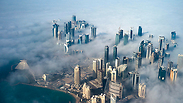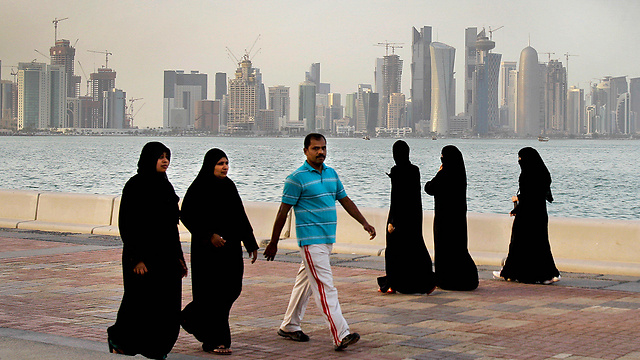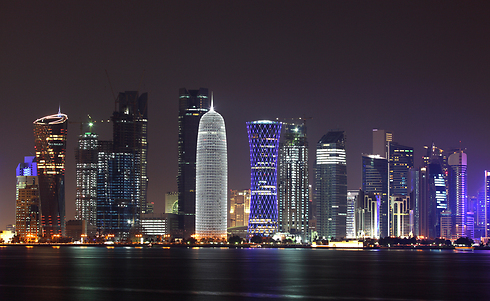

After demands aired, solution to Qatar crisis seems far off
As Qatari officials promise 'situation today is very comfortable' under Arab ban, Qatar is given 10 days to comply with demands, which include scaling back diplomatic ties with Iran, shutting down news outlets, handing over 'terrorist figures' and ending funding of all terrorist groups.
Faced with a sweeping set of demands, Qatar insisted Friday it can indefinitely survive the economic and diplomatic steps its neighbors have taken to try to pressure it into compliance, even as a top Emirati official warned the tiny country to brace for a long-term economic squeeze. Qatar is given ten days to comply with 13-point list.
Given ten days to make a decision, Qatar said it was reviewing the specific concessions demanded of the tiny Persian Gulf nation, which include shuttering Al-Jazeera and cutting ties to the Muslim Brotherhood. But Qatari officials did not budge from their previous insistence that they won't sit down with Saudi Arabia and other Arab nations to negotiate an end to the crisis while under siege.
"I can assure you that our situation today is very comfortable," stated Qatari Ambassador to the US Meshal bin Hamad Al Thani. "Qatar could continue forever like that with no problems."
Asked whether Qatar felt pressure to resolve the crisis quickly, he said: "Not at all."
According to the document, if Qatar agrees to the terms, it will undergo a monthly examination during the first year following the agreement, before switching to once every three months during the second year. After that, Qatar will undergo a yearly examination for the next ten years.
UAE Foreign Minister Anwar Garagash yesterday accused Qatar of leaking the document of demands, which was published by Arab press several hours prior to its official release.
"Qatar leaking demands and concerns of its neighbours and Egypt are either an attempt to undermine serious mediation or are yet another sign of callous policy," Gargash tweeted in English. "The leakage will further exasperate and prolong the Qatar crisis. Undermining serious diplomacy will lead to parting of ways."
Tweeting in Arabic, he said that the Qatari leakage was “a teenager move that we are used to seeing in the brother.”
As the United States stepped back from any central mediating role, all sides seemed to be settling in for a potentially protracted crisis. Qatar's neighbors insisted their 13-point list of demands was their bottom line, not a starting point for negotiations.
If Qatar refuses to comply by the deadline, the Arab countries signaled, they'll continue to restrict its access to land, sea and air routes indefinitely, as economic pressure mounts on Qatar.
"The measures that have been taken are there to stay until there is a long-term solution to the issue," Emirati Ambassador to the US Yousef al-Otaiba said in an interview. Suggesting the penalties would only be economic and diplomatic, he said "there is no military element to this whatsoever."
Having urged Qatar's neighbors to come up with "reasonable and actionable" demands, the US sought to distance itself from the crisis the day after the Arab countries issued a list that included several provisions Qatar had already declared it could not or would not accept. But the ultimatum was quickly rejected by Qatar's ally, Turkey, and blasted as an assault on free speech by Al-Jazeera, the Qatari broadcaster that the gas-rich country's neighbors are demanding be shut down.
Qatar has used its vast wealth over the past decade to exert influence abroad, backing factions in civil wars and revolts across the Middle East. It infuriated Egypt's present rulers and Saudi Arabia by backing a Muslim Brotherhood government in Cairo that ruled for a year until it was deposed by the army in 2013.
The current demands made of Qatar are being brought forth by the Saudis, the Emiratis, the Egyptians and the Bahrainis amount to a call for a sweeping overhaul of Qatar's foreign policy and natural gas-funded influence peddling in the region. Complying would force Qatar to bring its policies in line with the regional vision of Saudi Arabia, the Middle East's biggest economy and gatekeeper of Qatar's only land border.
"This reflects basically an attempt from these countries to suppress free media and also undermine our sovereignty," said Al Thani, the Qatari envoy. "They are trying to impose their views on how the issues need to be dealt with in the Middle East."
"They are bullies," he added.
The demands include shutting news outlets; curbing diplomatic relations with Iran; and severing all ties with Islamist groups including the Muslim Brotherhood. The United Arab Emirates said the list was intended to be confidential. The AP obtained a copy from one of the countries involved in the dispute.
The four countries cut ties with Qatar earlier this month over allegations that it funds terrorism—an accusation US President Donald Trump has echoed. Qatar vehemently denies funding or supporting extremism but acknowledges that it allows members of some extremist groups such as Hamas to live in Qatar, arguing that fostering dialogue is key to resolving global conflicts.
Diplomatic crisis has the world choosing sides
The move by Qatar's neighbors has left it under a de facto blockade. Although residents made a run on the supermarket in the days after the crisis erupted, the situation has since calmed as Qatar secured alternative sources of imported food from Turkey and elsewhere.
Yet resisting the demands could prove difficult.
"The four states can afford to wait, but Qatar cannot," said Fawaz Gerges, a Middle East expert at the London School of Economics. "This crisis could threaten the political stability of the ruling family in Qatar in the long term if it lasts."
"The demands are so aggressive that it makes it close to impossible to currently see a resolution of that conflict," said Olivier Jakob, a strategist at Switzerland-based oil consultancy Petromatrix.
Ibrahim Fraihat, Conflict Resolution Professor at the Doha Institute for Graduate Studies, forecast a prolonged stand-off. Qatar will reject the demands as a "non-starter", he said, and its neighbours had already escalated as far as they were likely to go. "Military action remains unlikely at the moment so the outcome after the deadline would be a political stalemate."
US Secretary of State Rex Tillerson has tried to mediate and earlier this week called on the Arab nations to limit themselves to "reasonable and actionable" demands. That call appeared to have been roundly ignored, and it was the Kuwaitis—who also offered to mediate—who delivered the list Thursday to Qatar.
"This is an Arab issue that requires an Arab solution," Otaiba said. "That's why the Kuwaitis will take the lead in the negotiation."
That's just fine, the US said. At the White House Press Secretary Sean Spicer called it a "family issue" among Arab states and declined to say whether the newly articulated demands were legitimate.
"This is something that they want to and should work out for themselves," Spicer said.
The most powerful country in the region to back the Qatari side in the dispute has been Turkey, whose President Tayyip Erdoğan has his roots in an Islamist political party similar to movements that Qatar has backed in the region. Days after the sanctions were imposed, Turkey rushed through legislation to send more troops to its base in Qatar as a sign of support.
Turkish Defence Minister Fikri Işık rejected the demand to close the base, saying it would represent interference in Ankara's relations with Doha. Instead, Turkey might bolster its presence.
"Strengthening the Turkish base would be a positive step in terms of the Gulf's security," he said. "Re-evaluating the base agreement with Qatar is not on our agenda."
Qatari Al-Jazeera fights for its survival
Thrust into the middle of the crisis, the head of Al-Jazeera's English language service said the Qatari-based news network remained committed to continuing its broadcasts.
"Any call to close to down or curtail Al-Jazeera is nothing but an attempt to muzzle a voice of democracy in the region and suppress freedom of expression," he said by phone.
Underscoring the growing seriousness of the crisis, state-run Qatar Petroleum acknowledged Friday that some critically important employees "may have been asked to postpone" trips abroad "for operational reasons" due to the embargo. It described the move as "a very limited measure that could take place in any oil and gas operating company" to ensure uninterrupted supplies to customers.
Among other demands, Qatar's neighbors are insisting that it:
* Curb diplomatic ties with Iran, and limit trade and commerce in accordance to existing US and international sanctions.
* Stop funding other news outlets, including Arabi21, Al-Araby Al-Jadeed and Middle East Eye.
* Hand over "terrorist figures" and wanted individuals from the four countries.
* Stop all means of funding for groups or people designated by foreign countries as terrorists. Despite former Saudi statements specifically naming Hamas, the Gaza-based terrorist group Hamas was not
mentioned as part of the current list of demands.
* Pay an unspecified sum in reparations.
* Stop all contacts with the political opposition in Saudi Arabia, the UAE, Egypt and Bahrain.

















